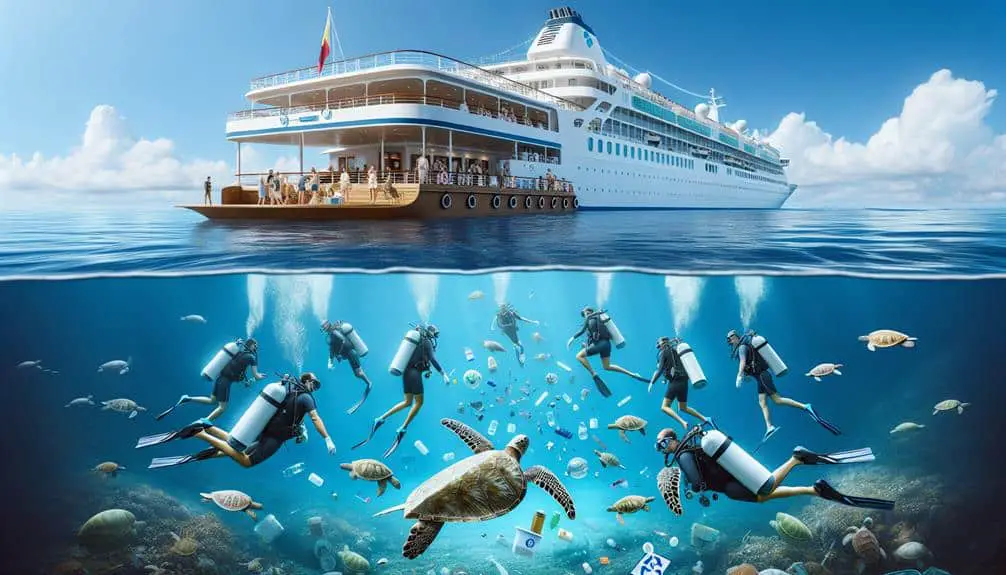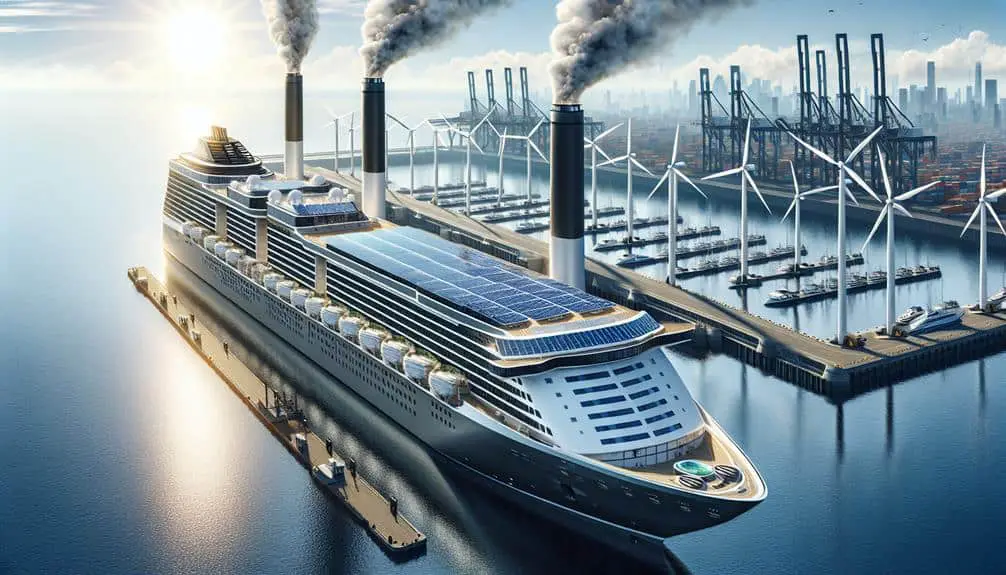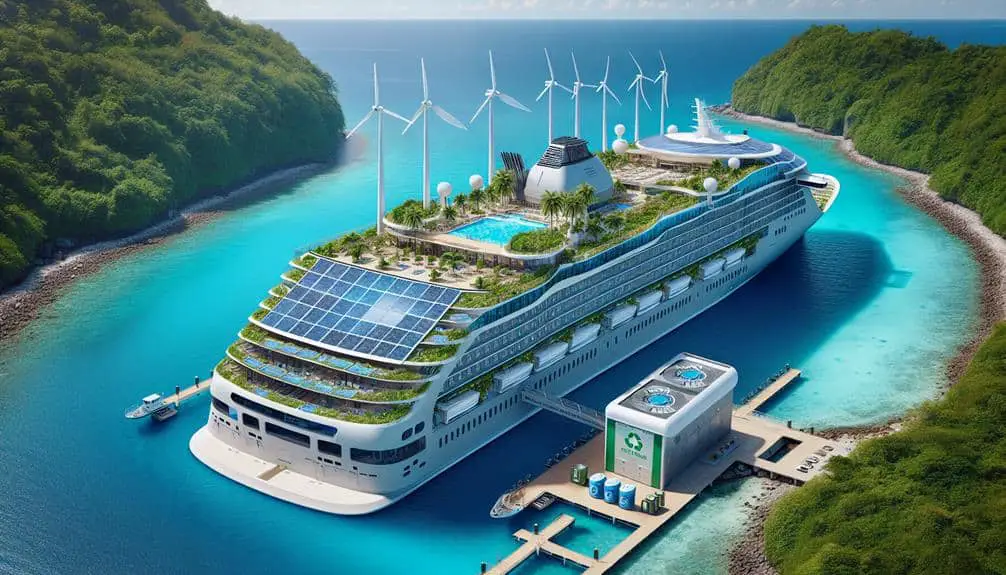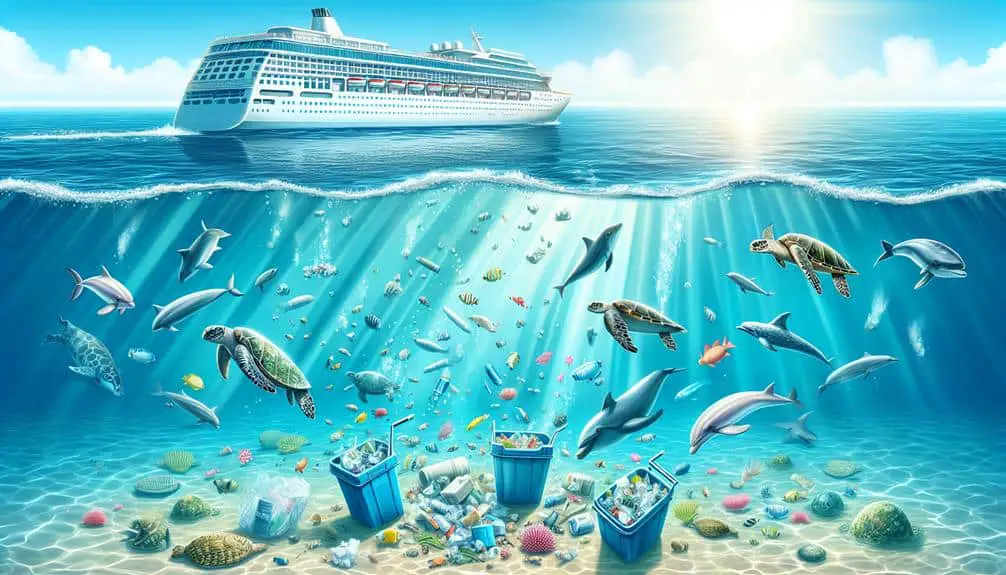Implement sustainable waste management with segregation and green technology. Support local marine conservation efforts like coral restoration. Educate on marine life protection with sustainable fishing advocacy. Reduce single-use plastics through policies and eco-friendly alternatives. Respect marine wildlife by avoiding sensitive areas. Promote responsible shore excursions prioritizing eco-tourism. Collaborate with research institutions for marine ecosystem understanding. Marine conservation on cruises integrates various practices to protect fragile ecosystems and biodiversity.
Key Points
- Implement sustainable waste management systems onboard.
- Support local marine conservation projects for biodiversity.
- Educate on marine life protection and sustainable fishing.
- Promote responsible tourism practices and minimize single-use plastics.
- Respect marine wildlife, habitats, and engage in ethical shore excursions.
Implementing Sustainable Waste Management
To effectively manage waste on cruises, implement a thorough sustainable waste management system. This system should encompass recycling initiatives, composting programs, and the integration of green technology for waste reduction strategies.
Recycling initiatives on cruises involve segregating waste into recyclable materials such as plastic, paper, and glass. Composting programs can further reduce organic waste by converting it into nutrient-rich compost for onboard gardens or disposal at appropriate facilities. Green technology, such as waste-to-energy systems or advanced waste separation technologies, can greatly reduce the volume of waste generated and minimize environmental impact.
Supporting Local Marine Conservation Efforts
You can actively support local marine conservation efforts by participating in initiatives that focus on protecting the marine environment within the communities you visit.
Engaging in community programs that aim to conserve marine life and habitats can have a significant positive impact on the sustainability of these ecosystems.
Local Conservation Initiatives
Supporting local marine conservation efforts is essential for the sustainability of marine ecosystems on a global scale.
Coral restoration projects play a pivotal role in enhancing biodiversity and protecting vulnerable coral species from the impacts of climate change and human activities. By actively participating in coral restoration initiatives, you can contribute to the recovery of damaged coral reefs and help rebuild their ecological functions.
Additionally, mangrove preservation is necessary for coastal protection and nursery habitats for various marine species. Mangroves act as natural barriers against storms and erosion while providing breeding grounds for fish and other marine organisms. Engaging in mangrove preservation efforts aids in maintaining the health of coastal ecosystems and supporting the livelihoods of local communities dependent on these critical habitats.
Community Engagement Programs
Engaging with community programs is essential for actively participating in and supporting local marine conservation efforts. Community empowerment plays a pivotal role in fostering environmental awareness and promoting sustainable practices.
Stakeholder involvement in outreach programs helps bridge the gap between conservation initiatives and local communities, fostering a sense of shared responsibility for marine ecosystems. These programs not only educate residents about the importance of marine conservation but also provide opportunities for hands-on involvement in restoration projects and monitoring efforts.
Educating Passengers on Marine Life Protection
When setting sail on a cruise, you'll partake in educational opportunities that promote awareness about various marine species.
Engaging in conservation impact activities will enable you to see firsthand the positive effects of responsible tourism practices on marine ecosystems.
Understanding the delicate balance of marine life protection is essential for promoting sustainable practices that benefit both the environment and future generations.
Marine Species Awareness
How can passengers on cruises actively participate in marine species awareness and contribute to the protection of marine life during their journey?
One way is through learning about marine species tracking and conservation partnerships. By being informed about the efforts to monitor and protect marine species, passengers can better understand the challenges these species face and how they can help.
Additionally, supporting sustainable fishing practices and advocating for the establishment of marine sanctuaries are essential steps passengers can take to protect marine life. Sustainable fishing helps maintain healthy marine ecosystems, while marine sanctuaries provide safe havens for various species to thrive.
Conservation Impact Activities
Passengers on cruises can enhance their understanding of marine life protection through participation in educational activities focused on conservation impact. Engaging in coral reef restoration projects provides insight into the importance of preserving these delicate ecosystems.
Additionally, beach cleanups offer a hands-on experience, highlighting the harmful effects of marine debris on wildlife. Learning about marine protected areas fosters an appreciation for designated zones that safeguard vulnerable species and habitats.
Understanding sustainable fishing practices educates passengers on responsible consumption choices that support healthy marine populations. By actively participating in these conservation impact activities, passengers not only gain knowledge but also contribute to the protection of marine life during their cruise experience.
Responsible Tourism Practices
Enhancing your understanding of marine life protection on cruises involves educating passengers on responsible tourism practices. To guarantee eco-friendly practices and ethical encounters with marine life, sustainable tourism principles must be followed. Here are three key points to take into account:
- Promote Eco-Friendly Practices: Encourage passengers to minimize single-use plastics, participate in beach clean-ups, and support local conservation efforts.
- Ensure Ethical Encounters: Emphasize the importance of maintaining a safe distance from marine animals, not feeding them, and respecting their natural habitat.
- Support Sustainable Tourism: Advocate for responsible tour operators that prioritize ocean protection, conservation initiatives, and environmental education.
Reducing Single-Use Plastics Onboard
To reduce the environmental impact of single-use plastics on cruises, implementing strict policies and promoting reusable alternatives is essential. Plastic alternatives and waste reduction strategies are pivotal in this effort. Cruise lines can opt for eco-friendly packaging and prioritize reusable materials onboard. This includes replacing plastic straws with paper or metal ones, offering biodegradable utensils and containers, and providing refillable water bottles instead of single-use plastic bottles. Additionally, implementing a 'bring your own bottle' policy can encourage passengers to use their reusable containers throughout the cruise.
Furthermore, cruise companies can collaborate with suppliers to source products packaged in eco-friendly materials. By choosing suppliers that prioritize sustainability and offer products in compostable or recyclable packaging, cruises can notably reduce single-use plastics onboard. Establishing clear guidelines and educating both staff and passengers on the importance of reducing single-use plastics can also contribute to a more environmentally conscious cruise experience. Through these measures, the marine environment can be better protected from the harmful effects of plastic pollution.
Respecting Marine Wildlife and Habitats
Respecting marine wildlife and habitats requires a thorough understanding of the ecosystems and a commitment to minimizing disturbances caused by human activities. To achieve this, it's essential to adhere to specific guidelines and practices:
- Avoiding Sensitive Areas: Stay informed about marine sanctuaries and protected zones along your cruise route. Steering clear of these areas helps prevent disruption to critical habitats and species.
- Proper Waste Disposal: Engage in proper waste management practices onboard and participate in beach cleanups during shore excursions. Marine debris can pose a severe threat to wildlife and ecosystems.
- Responsible Wildlife Viewing: When encountering marine animals, maintain a safe distance and avoid disrupting their natural behaviors. This includes refraining from feeding them or attempting to touch them, as it can have negative consequences for both the animals and their habitats.
Adhering to these practices ensures that the delicate balance of marine ecosystems is preserved and that marine wildlife and habitats remain protected during cruise travel.
Promoting Responsible Shore Excursions
Exploring responsible shore excursions is essential for reducing the impact of human activities on marine environments and ecosystems. When selecting shore excursions during your cruise, prioritize eco-tourism partnerships that focus on sustainability and conservation efforts. Look for tours that offer environmental education programs, allowing you to learn about the local ecosystem and how to protect it. Opt for sustainable excursion options that minimize negative impacts on marine habitats and wildlife.
Engaging in activities that support marine protected areas is another way to promote responsible shore excursions. Choose tours that actively participate in the preservation and conservation of these important areas. By visiting marine protected areas, you not only contribute to their maintenance but also gain a deeper appreciation for their significance.
Prioritizing responsible shore excursions through eco-tourism partnerships, environmental education programs, sustainable options, and engagement with marine protected areas is crucial in promoting marine conservation during your cruise. Make informed choices that align with conservation goals to ensure a positive impact on the marine environments you explore.
Collaborating With Research Institutions
By collaborating with reputable research institutions, you can actively contribute to the advancement of marine conservation efforts during your cruise. Research partnerships play an important role in enhancing the understanding of marine ecosystems and implementing effective conservation strategies. Through data collection initiatives conducted in collaboration with research institutions, you can help gather valuable information that aids in the protection of marine biodiversity.
Here are three key ways in which collaborating with research institutions can benefit marine conservation efforts on cruises:
- Enhanced Scientific Expertise: Research institutions bring specialized knowledge and expertise to the table, allowing for more in-depth analysis and interpretation of data collected during the cruise.
- Long-Term Monitoring Programs: Establishing partnerships with research institutions can lead to the development of long-term monitoring programs that track changes in marine environments over time, providing valuable insights for conservation efforts.
- Innovative Conservation Solutions: By working with research institutions, cruise operators can contribute to the development of innovative conservation solutions based on the latest scientific research and data analysis.
Frequently Asked Questions
How Do Cruises Ensure That Their Waste Management Practices Are in Line With International Standards for Marine Conservation?
To guarantee waste reduction aligns with international marine conservation standards, cruises execute thorough recycling programs, treat sewage before discharge, and limit single-use plastics. Sustainable tourism practices are essential for protecting marine ecosystems and biodiversity.
What Specific Initiatives Do Cruises Take to Support Local Marine Conservation Efforts in the Regions They Visit?
To support local marine conservation efforts, cruises establish partnerships with communities, fund conservation projects, and engage in sustainable tourism practices. These initiatives contribute to protecting marine ecosystems, promoting environmental awareness, and fostering community involvement.
How Are Passengers Educated on the Importance of Marine Life Protection and Conservation During Their Cruise?
Imagine being immersed in interactive workshops and educational programs on your cruise, where marine conservation is passionately taught. These initiatives enlighten you on the significance of protecting marine life, fostering a deep sense of responsibility.
What Steps Are Being Taken to Reduce Single-Use Plastics Onboard Cruises, and How Successful Have These Efforts Been?
To reduce single-use plastics onboard cruises, efforts include implementing plastic alternatives and robust recycling programs. Impact assessments and community partnerships gauge success. Progress is promising but ongoing evaluation guarantees continual improvement in marine conservation practices.
In What Ways Do Cruises Ensure That Passengers and Crew Members Respect Marine Wildlife and Habitats During Shore Excursions and Other Activities?
As you explore marine conservation on cruises, uncover the meticulous planning behind shore activities. Crew training guarantees passengers and staff respect marine wildlife and habitats, safeguarding these delicate ecosystems for future generations.




